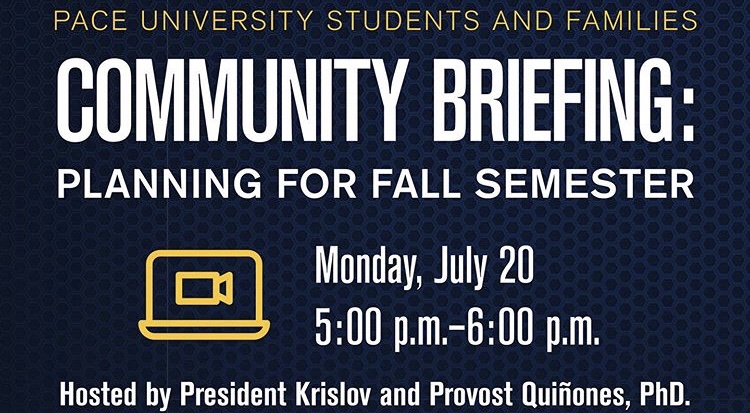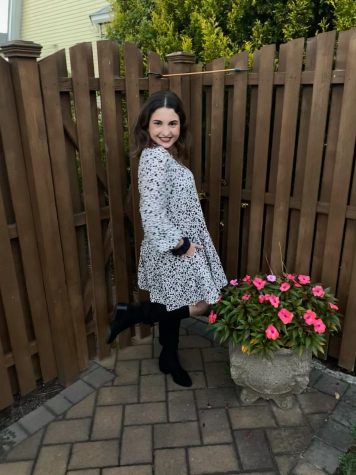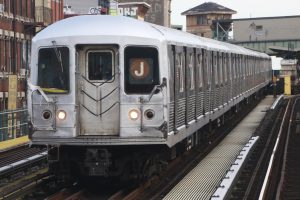Students react to University’s Community Briefing
July 24, 2020
President Marvin Krislov opened the University’s Community Briefing on July 20 to discuss the procedure for returning back to campus in New York City and Pleasantville by saying “We’re excited to be back, in whatever format. Our plans are flexible, our classes will meet both in-person and remote and we plan to adjust as the situation changes… We at Pace are moving forward and remaining vigilant…”
The Zoom panel included President Krislov, Provost Vanya Quinones, Dean of Students Marijo Russell O’Grady, Interim Associate Vice President and Pleasantville Dean for Students Rachel Carpenter, Associate Provost for Student Success Hillary Knepper, Director of Emergency Management Brian Anderson, Vice President of Administrative Operations/Technology Nicole Thompson, Vice President of Facilities and Capital Projects Ibi Yolas and Associate Dean of the College of Health Professions Gerrie Colombraro.
O’Grady stated in her opening remark, “We put students first in everything we do and this university still continues to offer excellent academic reputation.”
After the introduction, Carpenter immediately started answering questions sent in from students. The first and most important question for those returning is: “Is returning to campus safe? And particularly to Pace.”
Colombraro answered by saying, “In a word: yes. It is safe to return. I say that not only as the Associate Dean for Administration in the College of Health Professions but as a nurse for 50 years. I would not go anywhere where I don’t feel safe and I can tell you I have been back and I feel safe and it is ready…”
Colombraro went on to explain the plan for return was influenced by local, state and federal guidelines while also in accordance with the CDC and the American College Health Association. “Literally hundreds of members of the Pace community including students, faculty and staff have been involved in developing our plans,” she said, guaranteeing that the University is “safe and responsible.”
University junior Veronica Reyes from Massachusetts said, “In my opinion, the panel was poorly directed and uninformative. Pace dodged important questions and gave unclear responses to what school will look like in the fall. I, along with many other students, am left wondering how social distancing will be enforced and what protocol entails if a student or professor contracts the virus. Pace clearly doesn’t have a set plan in place. The administration wasn’t even able to give us definite move-in dates. Pace has handled this entire situation very poorly.”
Knepper was then asked to explain how classes would work, mentioning that faculty has trained for an online certification on how to teach online. There will be four main modes for teaching this fall semester: fully face-to-face, fully online, web-assisted or high flex. High flex (hybrid) is simultaneous, in-person for someone students while others are taking it from a remote environment.
Knepper said “We are going live with our updated schedule that includes all modalities, hopefully, by the latest, July 27. Log in, check it out, your advisors will be fully prepared. They will be reaching out or you can reach out.” Changes to schedules can be made by August 24, the first day of classes, while the usual add/drop process will remain the same.
When asked about Performing Arts, Knepper said, “We are still working with the performing arts school on how we are going to deliver face-to-face instruction…It is my understanding that there will be a smaller number of face-to-face classes in the fall.”
All students returning to the University, with a physical presence, will be required to return with a negative COVID-19 test. For those returning to campus from a state that is required to quarantine for 14 days prior to the start of class per request of Governor Cuomo, arrangements will be made by the University. It was not specified which campus, but there are hotels arranged for quarantine with Residential Life present.
Move-in will start August 10 according to Knepper, with no specification to which campus or how it will be arranged. There will be time slots that allow for social distancing and each resident can bring two people for assistance with moving in. Face coverings will be required.
University junior Matt Cartwright said, “I live in Dallas and I’m very curious as to how they’re going to handle us having to quarantine when we arrive… I already have a plane ticket for August 15 and classes start 9 days later. They seem to forget that not all students live in the Tri-state area and that people like me need to buy a plane ticket weeks in advance, so I can’t just come to school whenever. Although I feel safer in NYC at least because Texas is full of anti-maskers and COVID-deniers.”
Knepper added that although students coming from the Tri-state area are not required to quarantine for 14 days, they might be asked to under one circumstance: “For our students who are in the Tri-State area, we are going to ask folks to attest whether or not they went to Disney World for vacation two weeks prior to returning. If you did, you will be added to the list, but you can quarantine at home.”
The University Health Center services, through Telehealth, will still be available during the semester for any student that needs assistance.
In regards to mask-usage on campus, Russel O’Grady stated, “It is our whole expectation that they [students] will wear a mask. It’s really about education and awareness, we need everyone to comply…” Carpenter added that for those not complying with mask-usage and social distancing, “We will have to start treating these as social conduct concerts because it is a threat to public health.”
Carpenter mentioned that the Pace Chronicle, the student newspaper on the Pleasantville campus, conducted a poll that showed a majority of respondents (“a mix from New York City and Pleasantville”) agree with social distancing, mask-usage and testing.
Cartwright said, “Well I honestly think the Pace administration doesn’t understand the reality of going to school at a campus like the NYC campus. Pleasantville and NYC are drastically different schools, so these guidelines that they’re talking about may be easily applicable in PLV, but not our tiny building in FiDi. Social distancing will be impossible in the cafeteria for example, and they haven’t even addressed how they’re gonna handle that during common hour.”
Specific changes have also been made in classrooms to create a safer environment; plexiglass was added as a barrier between students and faculty, signs have been posted to enforce distancing, stairways will have a designated flow, elevator capacity will be reduced, air filters will be changed and a disinfecting team has been added to the staff for extra precaution.
The University will also provide all students, faculty and staff with two face coverings and hand sanitizer upon return.
Cartwright said, “Another example is ‘limiting the capacity’ in elevators. I live on the 29th floor in Beekman, yet they expect me to just take the stairs instead of trying to get an elevator. Clearly they’re not in the school enough to understand the impracticality of some of the things they expect of us.”
Stated in the original guidelines released, there will also be a designated Coronavirus Coordination Officer added to the staff. In regards to if the campus has to transfer to 100% online, Anderson said “New York State Department Health does require our reopening plan to include contingency for a return to remote learning.” Triggers for that include case rates and other parameters from the New York State Forward Plan.
Traveling is allowed during students’ time on campus as of now while following the guidelines of New York State. It is encouraged to stay on campus, however, and for commuters to limit their travel.
Door-to-door delivery is not permitted but there will be a designated station on each campus for delivery to residential students as there is an increase in mobile-ordering programs and dining to-go.
Anderson also mentioned that the Pace Safe app has a daily questionnaire that students, staff and faculty will be required to complete in order to return to campus. The questionnaire will allow the University community to monitor symptoms and ensure protocols are being followed.
In terms of tuition being changed for classes transitioning to remote learning, Knepper said, “No, at this point we are not reducing tuition. Really when you look at it, our tuition is to support the same quality of education and investment in technology and it’s the same quality faculty. We still have to maintain all these expenses…” She added that all services provided on campus will continue to be provided, “some fees will be adjusted here and there [meal plans and others as we go along.]”
University junior Grace Flood from Pennsylvania said, “My reaction to the whole briefing was pretty negative if I’m being completely honest. The fact that they refuse to acknowledge the vast difference between online classes and in-person is infuriating. Everyone knows that learning strictly online is significantly more difficult and a less effective way of learning for many students. The team of “leaders” at Pace that we saw at the community briefing needs to recognize this and decrease tuition to some extent. I can not justify spending the same amount of money on tuition to be sitting on my laptop taking classes.”
Flood continued, “I was meant to be returning from Pennsylvania to NYC, but the briefing as a whole made me feel very disheartened about Pace’s approach to this semester. Especially since they are using the same approach in NYC as Pleasantville and they are two incredibly different campuses. I am very disappointed and will likely not be returning.”
Student events will also continue to take place and space will be available for use with guidelines set in place. “It’s going to be great, we can still have fun…” O’Grady stated.
You can watch the community briefing here https://www.youtube.com/watch?v=PWzJrg09nEY and find up to date information here https://www.pace.edu/return-to-campus










